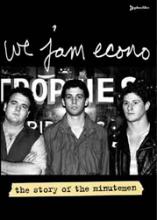Whereas the Ramones documentary was willfully a bummer, only the final moments of We Jam Econo, a film detailing the career of San Pedro’s the Minutemen, are downer notes. But that should be expected. After all, the bands lead singer and guitarist died just after one of the Minutemen’s highest profile gigs.
It’s odd to hear Mike Watt, the band’s bassist and current member of the Stooges, reminisce about such a moment as covering a Television song on-stage with REM and then hearing about his friends death. But Watt, more so than anyone in that aforementioned Ramones feature, comes off like a regular guy. One might attribute that to being, not a New Yorker or a Los Angelino, but from some town south of Hollywood’s nonsense. An place set off by itself which perhaps allowed for the royal stew that became the Minutemen.
As the second album released by Black Flag’s imprint, SST, the Minutemen’s Paranoid Time, released in 1980, was really detached from the burgeoning hardcore scene. The speed was left in tact, but the wit and intellect of D. Boon, Watt and George Hurley is immediately significant when contrasted with the heavy handed second wave punk bands then cropping up around the country.
Not to denigrate the likes of hardcore’s cognoscenti, but for all the brute strength and effort working towards a unified scene, it would have made more sense for an all inclusive approach, aped by the Minutemen both musically and politically, to have resulted in a positive force. And a step forward.
The film, details this pretty well with interviews ranging from the Circle Jerks’ Keith Morris to members of the Urinals and even rock writer (and song writer for Blue Oyster Cult) Richard Meltzer. The wide swath of folks who apparently appreciated even the truncated career of the Minutemen is astounding. And is really why the moment these Pedro natives got on stage with REM could have been a watershed moment for American rock music.
Boon’s death, oddly enough, really coincided with the end of America’s proper flirtation with punk and hardcore in any sense of a mainstream product – not that the band was set to change up its style to sign to a major label. But after 1985 – as documented in American Hardcore – music shifted and resulted in the birth of what would arise in the wake of this music coming out of punk’s heyday. So, whatever you think of Seattle, that wouldn’t have happened if not for SST and the Minutemen.
